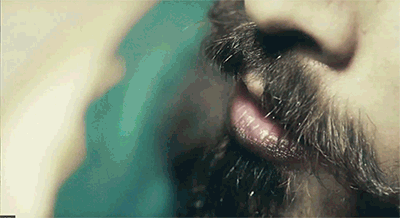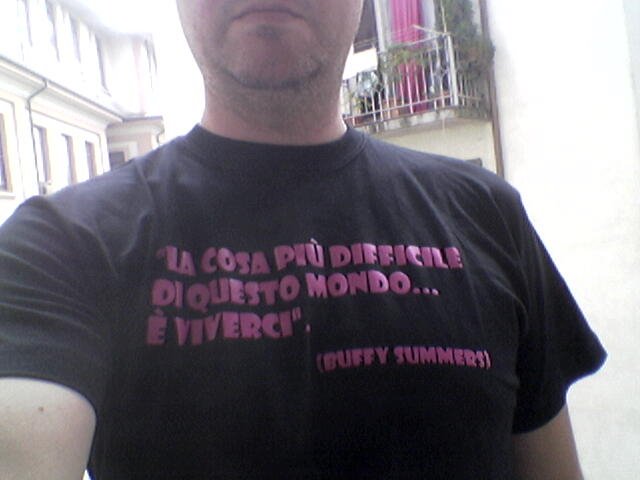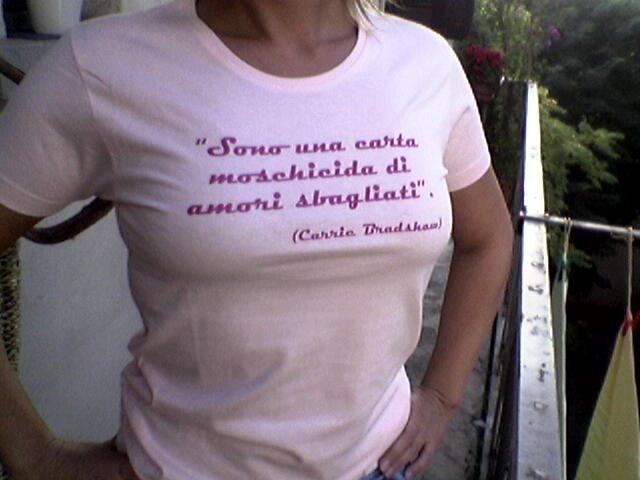Pubblichiamo la seconda e ultima parte dell'intervista a Damian Lewis di "Homeland" realizzata da Kaye Schilling di "GQ" (Usa) - La prima parte nel Post di ieri.
GQ: Last year's finale was possibly the tensest episode of TV I've ever watched. The scenes in the bunker, where the bomb is strapped to your chest and it doesn't go off, and then you reset it in the bathroom—it was exhausting! How do you conjure up and maintain that kind of intensity?
Damian Lewis: The short answer is imagination. You build structure around yourself, you build walls around that reality until its water tight, and then you drop yourself in it, like it's a tank, and you don't let anything dilute it or invade that space. But by that stage in the season I'd spent four or five months playing a guy who is clearly very confused, whose conviction is honorable, but whose means to deal with it—the way he wants to deal with it—is less honorable and will result in mass murder, so it's not excusable in any way. But he's such a compelling character that it's understandable why he wants to act, because there are plenty of people who sympathize with his viewpoint regarding [the war in Iraq], if not the means in which he wants to deal with it.
GQ: That's one of the keys to the show's success, I think, that you do sympathize with a U.S. Marine who is a mole for Al Qaeda.
Damian Lewis: This was what was great about the first season: Brody's two realities. If you like, he's working under cover, so he lives a life of deception and dishonesty. But at the same time he's a man genuinely struggling with coming back from a war zone, who has been abused and changed in some way—just radically changed. And he's trying to make sense of his life at the same time. And that was always a clever piece of writing, because people—not everybody—but some people found themselves sympathizing with him while condemning him at the same time. So it was confusing for the audience. And I think that sort of ambiguity, that sort of strange place he lives in, comes to a peak at that moment where he wants to act in the name of an ideology and a cause, and is brought back from the brink by the real love of another human being, his daughter Dana. This bubble that he's lived in, this trance-like state he's lived in so he can commit an act of murder and suicide, is pierced by the sound of Dana's voice on the phone. That brings him back, which was a good message at the end of last season. That's more important than—that wins over some abstract cause that he's placed his faith in.
GQ: Is Brody's veneer cracking in season two?
Damian Lewis: Without giving away any spoilers, it's safe to say that at the end of that first season, he makes himself clear to Abu Nazir—who is turning out to be one of the great, abusive father figures in drama. For anyone who has had a bad relationship with their dad, or a confused relationship with a mentor figure, he will ring very true. He abused and broke this man when he was his prisoner, and then loves him, or shows him love, and forgives him in equal measure. So Brody is a complete abuse victim. He takes a very strong stand at the end of the first season; he's unable to go through with what Abu wants him to do and says he wants to choose a non-violent path. He stands up to this man for the first time in the seven or eight years he's known him, and what's going to be Brody's dilemma this season is that they won't let him. They won't let him be the man he wants to be because they effectively have him. And whereas before Brody was an unsettling figure for the viewer—no one quite knew he was, or what he felt, or what he was going to do, because Brody himself didn't really know that—now, I think, he's made a statement and he won't be allowed to act naturally. That's his dilemma, his tragedy, running through season two.
GQ: And now that Brody is a congressman, a public figure, he's also having to maintain a public face.
Damian Lewis: That's in addition to the domestic face he still has to maintain for his family. He's living a double life much more knowingly now. So Brody this season is in an even more heightened state of paranoia, never quite sure when people are going to contact him. So there's a shift there.
 GQ: Did you have any reservations about the part before you accepted it?
GQ: Did you have any reservations about the part before you accepted it?
Damian Lewis: I had a conversation with Howard and Alex just before accepting it, which was all done by telephone because I was filming in Manchester at the time. I just said, If this is a show about how a U.S. Marine is converted to Islam and then is radicalized and becomes a violent Muslim, I don't want to do it. Because I think that's dull and irresponsible. Then you're just a Muslim baddie, and I think that's unhelpful right now. I said, If his conversion to Islam is something that can be sustaining and nurturing to him, and actually is a force for good, and is actually something that is very peaceful and beautiful, then I'm interested. And I think that's more subversive, actually. And I think they kept to their word, and very painstakingly tried to find motivation for Brody that's, you know—it's too easy to make it that he's brainwashed. Brody's not brainwashed, he's broken, definitely, and he's abused and a confused soul. But the reason in the end that he wants to blow up the Vice President is because he's committed acts of terrorism, and it's for more personal vigilante reasons that he wants to act and take revenge. Abu Nazir actually doesn't successfully radicalize him. I don't think that's ever suggested in the first season. And that's why when it was finally decided that he would strap on a suicide vest, that surprised me, and I fought it for a bit: Really? Are you sure that's what you want to do, given all the work you've done about trying to promote the idea that Brody is not an Islamic or Muslim terrorist. But it was so powerful and symbolic, and such a political gesture to do that.
GQ: How much input do you have in the role?
Damian Lewis: I made that point clear at the beginning, and they are always happy to have my input, but honestly the role is taxing enough that it just needs all my attention, and for me to be sending notes or getting into conversations about trying to change things? That actually delays the final draft arriving. So I need to just get working with what I have.
GQ: Have you thought about who Brody was before the war?
Damian Lewis: He was a regular Joe. A conservative, Southern guy who had enough smarts about him maybe to set up his own company in carpentry or construction or something; he wasn't the guy just shifting the rubble. But, you know, two kids, a dog, an SUV out the front, a pension plan. Kind of uncomplicated. And I think totally changed by the war. A little bit older than his wife, who he probably met while she was still in high school. He was 21 and she was 17—something like that. Put the moves on her. Maybe waited until she was legal.
GQ: What kind of preparation did you do?
Damian Lewis: I read a lot about Islam. I have a Koran by my bed. I went to the Central London mosque, and, you know, they are all bending over backwards to create a good image. The PR is working overtime. So they are very welcoming. They invite you in to observe prayer. And I'm good friends with Imam Bisam, who runs the Islamic community in Charlotte, and he's invited me into prayer.
GQ: This might be too personal, but are you religious?
Damian Lewis: I grew up in a totally middle of the road Anglican household, and we had chapel every day at boarding school. I was always the prayer of St. Francis, so it was very much a part of my life. But I'm not a believer. I don't believe in the Resurrection or the Holy Trinity, so it kind of stops there, right? There are certain things, certain central tenets, you kind of have to buy into. What I do believe in is the moral code of Christianity. I believe in Jesus as a profit, though not the son of God. Which is what a Muslim would tell you, too; that's he's one of the five revered prophets. But I'm a little inclined to think that religions are a little like cults, and I particularly feel that after spending time in the South.
GQ: Were you following the war before you got this part?
Damian Lewis: Of course. I was among the million or so people who marched against the war in Iraq in 2003. And that was part of the concern for me—where would the show go politically.
GQ: Because Howard and Alex, who were writers on 24, got flak for that show being too conservative?
Damian Lewis: [24 co-creator] Joel Surnow did initially, more than Howard. I think that was a very Might is Right response to 9/11. Jack Bauer would just get it done—he was a kind of hunky, macho, grunting hero.
GQ: Bauer was so freaking serious. Just once, crack a joke!
Damian Lewis: I know! I've met Kiefer and he's a witty guy. Actually he's very entertaining to spend time with. So they could have written to that, but they chose not to.
 GQ: To me, 24 was more of a cartoon—as opposed to Homeland, which has more nuance and feels emotionally deeper.
GQ: To me, 24 was more of a cartoon—as opposed to Homeland, which has more nuance and feels emotionally deeper.
Damian Lewis: I'm glad you think that; I think that too. I think that's Alex's contribution. It's very much more where his sensibility lies. And as you know he co-created the show with Howard and they've known each other since they were 19. They roomed together at Princeton.
GQ: President Obama's other favorite show is The Wire, which starred Dominic West. I read somewhere that you started acting after you saw him do Hamlet. Is that correct?
Damian Lewis: Not strictly, but we were at the same school together—Eaton—and I saw him do Hamlet. He was a few years ahead of me—I think he was 17—and I thought, Wow, he's fantastic. That's what I want to do. But I'd been acting since I was eight. Drama was a really important part of the curriculum at the schools I went to, and I loved it at the word go. I was just always better and happier when I was doing theater. And then I said to hell with university and decided to go to theater school in London. And I've been just very lucky.
GQ: Did you ever think, I'm going to be an American TV star!
Damian Lewis: Not at all. I came out of the classical theater. You know, American TV for me, as a kid, was Batman. It was Adam West and Burt Ward! And, you know, CHiPs, Dukes of Hazzard. That's the American TV I grew up on. So that was another world, and nothing to do with my experience.
GQ: There's a sense these days that TV roles are richer than what you find in movies. Would you agree with that?
Damian Lewis: It depends on what kind of movie or TV you're making. But I do think there are more roles written for men in TV, and that's because the classic arenas of hospitals, crime, and law tend to work better with men and women rather than 24-year-olds. Casting directors are generally looking for hot and new and shiny for film. Hollywood doesn't seem to want to spend the time to make stars anymore. But I think one of the reasons the writing on American TV has gotten so much better than when I was watching as a kid, is that the best of it does feel like films. One reason is that a lot of the big film directors—like Gus Van Sant, Michael Mann, Martin Scorcese—are in TV now. But I think it also has something to do with the independent film world sort of dying out in the past five years—films like Keane, which I was able to make in New York City six years ago, was almost like the last moment you could get a film together in the two million dollar range and have it seen by anyone.
GQ: Last question, and I save the best for last. Tell me about your groupies, the Damian Bunnies.
Damian Lewis: What can I tell you that you can't imagine?
GQ: When did you first become aware of them?
Damian Lewis: I feel like they've been around for a long time, though I genuinely can't remember when they first appeared in my life. You know, they're a fantastic group of fans.
GQ: How do they, um, celebrate you?
Damian Lewis: They send me their panties. [Laughs] This is an old story now, but it's very entertaining. About five or so years ago, the members decided to send me their panties for my birthday. This one woman coordinated it, and about forty women responded. I got sent this Victoria's Secret's box full of underwear from as far away as Australia. There were little tags attached to each one, with a name and age and hometown. So, for instance, an enormous pair of Granny pants, saying "Hi, grandmother of 17 from Minnesota." And then a lacy g-string: "Hi! I'm 19. My name is Kimberly and I'm from Australia!" I had them strewn around my bedroom—I mean, how often does that happen? And after about 48 hours, I remember thinking, You are a sick bastard, you better clear these knickers up. So I throw them in the trash and put it outside for collection. I go out and come back later that night—at this point, I lived in Camden Town, on the same block as Amy Winehouse, and it's an old, cobbled street, very Dickensian, and it had been raining, and the moon was hitting the cobblestones in a very picturesque way, and I turn onto my street, and I think, What is all that shit in the road? And I get closer to it and I realize it's all the panties, all in a line, going around the corner, like Hansel and Gretel's bread crumbs.
GQ: I can't believe you threw them all away.
Damian Lewis: Don't tell them.















.jpg)















1 commento:
che uomo!
Posta un commento